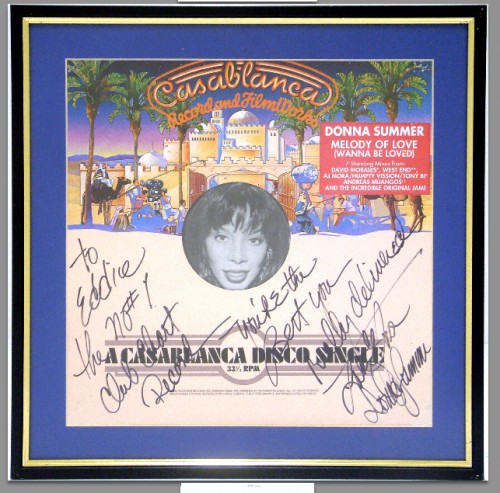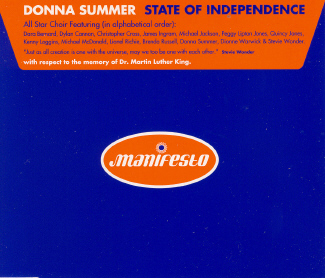Manifesto
An interview for Universal on the history of Manifesto


“I was only meant to be to be a scout, in the office one day a week back in 1996”, recalls Aussie born London DJ and A&R man, Luke Neville, “but I loved it so much I ended up coming in the office every day, and often staying until ten or so, just playing records with the Manifesto Records creator and V8 engine Eddie Gordon passing on his fountain of knowledge to my thirsty ears. “Eddie, then a very successful manager, remixer, radio producer and dance music aficionado, had been approached by the managing director of Mercury Records back in October 1994, to set up a label that would, as he puts it “from a blank piece of A4 paper, show those guys at FFRR, Deconstruction, Positiva, AM:PM, and Perfecto how to build and market a multi genre dance label.”
Eddie came up with the name Manifesto, created the logo with the famous sunflower and recruited Judge Jules to co A&R, promising also to help raise his national Radio profile. ‘The Judge’ was then best known for his weekend DJing slots on Kiss FM in London. Looking back at those times, Jules says “it’s as if myself and a bunch of mates hedged our bets and a few paid off.” Jules, in turn, brought in Luke, whom he knew from London’s club circuit, and the three of them would listen. And listen. And learn.
What a selection of records they would play. Though not as well known internationally as he is today, Jules still commanded a significant following in the South East, thanks to his Kiss FM show. Having established his reputation with the proto-glam house night, MFI, he also garnered top spots at clubs like “Up Your Ronson” in Leeds and “Love To Be” in Sheffield, drawing promos from an increasingly heterogeneous selection of sources.
“Our intention was to not get stuck in a sound barrier like AM:PM (House) or Perfecto (Trance)” says Eddie, “but to release good music across all genres of dance and bring through an artist that would sell albums, plus give a good representation of what was happening in Europe, especially Ibiza.” Selling singles as well as albums, putting out tunes that went down as well in London VIP rooms and Balearic terraces, was a novel idea at the time. “Our Manifesto was our declaration of intent to build a music label. We succeeded on every aim really, I signed Karen Ramirez she had a No: 6 hit with the debut song I asked her to record “Looking For Love” and we released her album, “Distant Dreams”, to media acclaim. The Cafe Del Mar albums exploded.
One year, 1996, we even broke the UK record for one label having No: 1 hits in the National Club Chart with a total of nine No: 1’s in the same year. Basically we were at top of the charts nearly all year long. Our offices, sandwiched in with the Mercury, Talking Loud and Fontana labels were always populated by staff from other record labels, artists, remixers, dj’s, some smoking funny stuff but all laughing and shouting. It was an incredible buzz to be around all these people and their energy. I liked that energy around me from my days in Gravesend with the “Flat” crew all adding to the creative madness.”
L to R: a fit Eddie Gordon (Head of Label), Jules (Dance A&R) with a Manifesto U Um Umbrella and lucky Luke Neville (Dance A&R). Happy plotting in 1996.
“On my first morning after being greeted by Howard Berman the MD and a good guy, I remember the Director of Business Affairs, David Perez, telling me I was “wasting my time” says Eddie, “as surely you don’t think you’re going to beat FFRR as Polygram’s leading established dance label.” Yet Eddie enjoyed the last laugh. “Within a year FFRR’s top dance A&R

man, Pete Tong, had stopped playing our records on his Friday night Radio 1 show because we were kicking their arse so bad and they were breaking all company rules to nick the records we were thinking of signing like Stretch and Vern’s ‘I’m Alive’.
We had them rattled from their post room to their Board Room, AM:PM at A&M Records too with their Managing Director actually making copies of records we’d already signed. By which I mean our No: 7 hit Gusto “Disco Revenge” and their poor cover version aptly called Desperado – our success brought out some of the worst sides in our competition causing our artists to lose ten’s of thousands of pounds in royalty payments but we stuck steadfast to our task of delivering the hits for the people who entrusted their art to our eager hearts. Being signed as a producer myself, Jules and Paul Dakeyne also, we all knew what both sides of the fence were like and vowed never to let the company rip our artists off while we were in a position to manage things.
As a footnote, David Perez went out of his way to assist and bend a few rules to help us sign up the hits we were so hungry for, especially Josh Wink from Mark Finkelstein’s Strictly Rhythm in NY.”
Some of Manifesto’s success lay in it’s unequivocal embrace of the mainstream, regardless of daft pigeonholing. “We were into anthems,” recalls Luke, “whether they were by acts that Eddie already knew like Todd Terry and Byron Stingily from his days at MCA or Atlantic records or Josh Wink, a new kid on the block.” This emphasis on mainstream appeal was in part informed by Jules DJing style.” I try to champion records that will eventually cross over” he says, “if you listen to a set of mine six months later it will sound commercial, but that’s because they’ve gone onto bigger and better things. It’s all about when you start and stop playing them”
Yet, with this popular selection of material also came some very shrewd marketing. “Manifesto wanted to be better than everyone else,” says Ben Cherrill, an excellent A&R manager at the label from 1998 onwards, “the marketing and promotion was very aggressive for the first 2-3 years, to get the label established.” Eddie continues “I felt that Manifesto was playing catch up with the other labels so with Jules, Paul Dakeyne, Liz Walton, Tony Nuxy, DJ Paulette and Luke we all went into a branding overdrive with DJ bags, tee shirts, slip mats all adorned with the sunflower logo.
I remember in the early hours of the morning, around 5am, at a Manifesto launch party in the famous Amnesia club (Ibiza), Jules and Luke were DJ’ing, the team were dancing all over the venue, when somebody came rushing up to me shouting that all the Manifesto merchandising had gone from the Amnesia sales counter. “What stolen?” I asked, “no” they laughed, “there’s only one label mix cassette left. They’ve bought every single tee shirt, bag, record, slip mat. Its all gone.”
The cash proceeds paid for 10 of us to be going nuts in Ibiza instead of sitting at our desks at 10am on a Friday morning. By walking into the MD’s office upon our London return and handing over all the cash to him, to a stunned expression, I was able to use that successful chunk of money as justification for our branding trip as it paid for everything, the flights, villa’s and expenses. We could have kept the loot, nobody expected otherwise, but I had bigger plans for the label with the Cafe del Mar releases, which proved very prudent. Thanks Howard.”
One of the additional attractions of adding Jules to the team was his studio knowledge as a remixer, something Eddie shared after working at the PWL studios for a year and having a No: 3 national hit with Westend Feat Sybil “The Love I Lost” (also staying at No: 1 in the UK Club Charts for four weeks). Using his studio nous Eddie was able to persuade Donna Summer into re-recording the vocals to her 1977 disco masterpiece, “I Feel Love”, in New York, because the original mastertapes were burnt in the famous Casablanca fire in California. Eddie knew if he could get Donna behind the microphone to re-record the vocals again, then totally remaking the record from scratch was easy, but he needed her full support. She said ok, as long as she and her husband Bruce could approve the recordings, naturally. A bond between Donna, her husband-manager Bruce and Eddie was built which enabled Eddie later to pull off another coup for one of his all time favourite artists.

Says Eddie “I remember hearing “I Feel Love” for the first time when I was 17 in a disco and it rooting me to the spot listening to it loud through those big speakers. The power of it blew me away then”. The new 1995 remixes of “I Feel Love”, by Rollo and MAW was Manifesto’s first huge hit single, all over the world. Giving the label a massive DJ fanbase to continue with and the first 14 Manifesto releases were all Top 40 UK hit singles.
A monster was born. Jules stepped up too catapulting Josh Wink’s acid anthem from tech-house obscurity and into the top ten, as well as Luke signing and shooting the video for David Morales’ Needin’U in a weekend with only a credit card for a budget and managing to place it at the top of the 1998 MTV dance chart, were just a few of the label’s canner achievements.
As a team they were unstoppable after bonding together in Ibiza on Eddie’s ’96 branding trip. Yet it wasn’t all uptempo floor fillers. Indo Aminata’s 1996 album, “When You Have The Greatest Dream”, produced by Planet Funk, with remixes from The Fugees (their first ever remix with Wycleff wanting Indo as Mother Africa), Massive Attack, Dillinger and A Guy Called Gerald is one of the 1990s most overlooked albums. “It was very much ahead of it’s time, sometimes you can’t wait for the world to catch up with you” says Eddie. Indo, a Mandingo Princess from the Gold Coast of Africa, was also the very first act to sing live on stage to the Sunset at the world famous Cafe Del Mar in Ibiza. Her album is now on iTunes if you want to check out Indo’s incredibly deep songs.
Conversely, The Cafe Del Mar, pairing the laid back selections of Ibiza’s DJ Jose Padilla (RIP) and Bruno Lepretre, went on to sell around 15 million CDs, at a time when it was fairly diffictult to shift long players. Conceptualised by Eddie, signed to the label after one visit to Ibiza in 1994 with Liz, against the parent company strategy, and the reason that Manifesto Records is the most profitable label in dance music history due its the multi million worldwide sales, which are still selling today.
Eddie continues “many years later the Universal CEO Lucian Grange congratulated me on the Cafe Del Mar signing saying that at the time Mercury Records, our parent company, was suffering from its big acts like Def Leppard and Metallica not selling due to the BritPop explosion of the mid ’90’s, and that the surprise hit of the Ibiza sunset albums had saved Mercury. It was like signing a mini U2 rock act he said.” With the reigns handed over to Luke on Eddie’s departure in ’97. Luke says, “”I was most proud of those, I just loved the music we were able to popularise.” And, as if to prove his point, has returned to his native Perth, Australia, and set up his own range of beachside bars after a lunch time chat in 2000 with his mentor, Mr Gordon.
In 1995, 1996 and 1997 the label was voted best dance music label of the year. In October 1997 Jules moved from Kiss FM to Radio 1. The late summer of 1997, an in-house party was held for the label’s pioneering inspiration Eddie who felt the urge to start from another blank piece of paper so left the company to form his own label Neo Records and to begin putting the BBC Millennium celebrations together for Radio 1. This move lead to a promotion for Luke and the addition of Ben Cherrill to the Manifesto A&R team. The following summer it signed another huge hit with, “Needin’U” by The Face (AKA David Morales). In 1999 their big hit was “The Awakening” by York.
In 2000 “Airwav” by Rank 1 was their definitive club smash. 2001 saw Jules’ departure from the label. The following year Manifesto began to wind-up proceedings, a move partially brought about to bottle the labels unique period because of it’s unprecedented success. “Me, Kiss FM, Radio 1, all that we’ve spoken” says Jules, “follows the progression of dance culture in this country from a cottage industry to a branded corporate venture.”
Yet with such success comes diversification. “We’ve had Manifesto staff reunions every now and then,” says Eddie, “and we kind of feel that the peak of the label in ’96 -’97 was an incredible time for us all to be together, when dance music was a free energy of love, exploration and the world wanted to dance.
In that ’94 Sept week, Liz and I knew that we were going to start work for Mercury as soon as we got back to London and we had a small vision of how we wanted to have the label. It was music and people, building on their combined energies. I just kept going back to Howard the MD saying I need this person to fufill this function or that person for this role and he kept letting me bring them in which meant that we had to keep rolling the hits in as well to pay for the salaries but soon we had a hand picked group of great music lovers. The freedom of expression in the music was purely from our belief of our own Manifesto for life.”
An anecdote from those days – One afternoon a male employee (Peter) from the Mercury press-dept came into my office waving the Josh Wink “Higher State Of Consciousness” 12″ saying “what is this all about ?”. I had a small office with two big speakers either side of each arm of a leather sofa. I put the record on the turntable, invited him to sit in the middle of the sofa, sparked up a joint I was saving for that evening. Gave him the joint, turned up the volume of Josh’s record and walked out of the office saying I’ll be back when the record has finished.
When I came back he said “oh my god that is amazing” and off he went to write up his press release. I’d be fired for doing that these days, although the MD was often in my office asking if I had some smoke for chilling out later that evening.
Manifesto’s back catalogue still speaks for itself; popularist, genre free and good for office stereos and dance floors alike, the back catalogue is dance music’s own declaration of independence. On Ebay there are currently 23 pages of Manifesto Records releases from that halcyon period bearing testament to the music signed to the label by the team.
Listening to Eddie’s Millennium 1996 remix of Donna Summer feat Martin Luther King “State Of Independence” you’ll hear a label in the centre of its own hurricane eye – peaceful, bristling with creativity rhythm and melody. Eddie “It’s my best remix ever, coming together over two weeks in Olympic Studios in Barnes, South West, London with Steve ‘Barney’ Chase. Thanks to Donna’s husband Bruce we were given the original Quincy Jones’s mastertapes from his Qwest Studios with the BV’s from Lionel Richie, Michael Jackson, James Ingram, Stevie Wonder, Dionne Warwick, Michael McDonald and more so we had to take our time across the 48 tracks to painstakenly re-build those incredible vocals in the new mix.

When we got Quincy’s and Donna’s approval for the inclusion of the Martin Luther King speech we were thrilled as that was how we wanted to deliver Donna back on Radio in 1996. I heard it here on the radio in California last week, some 24 years later and I was instantly surrounded by those great people and memories again. Wonderful, wonderful times.”
In acknowledgment says Eddie “there were some very significant and considerable contributions from Bruno Morelli who was a giant for us at Radio, the wonderful Liz Walton, a foundational inspiration from 1994 and the longest member of the team, DJ Paulette in Press, Paul Dakeyne dealing with Giorgio Moroder and Lets All Chant for Gusto, Tony Nuxy, Ann Marie Bigby, Candice Strickland, Jo Weinberg (RIP love), Sheila Aslam, Tom Bird, Damon and the Mercury Records staff.
The originals and the visionaries. (L-R) Howard Berman MD, Eddie Gordon. Anne Marie Bigby, DJ Paulette, Tony Nuxy, Judge Jules, Paul Dakeyne & Liz Walton (wondering why Jules is not talking to his plastic dancing sunflower pot) 🙂
















